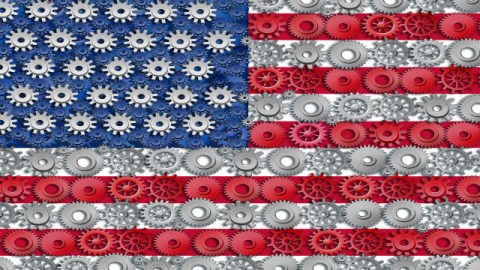A U.S. Manufacturing Renaissance?
Historian Niall Ferguson responds to a recent study suggesting that the US is on the verge of a manufacturing renaissance. He believes that major legal and economic reforms would have to take place first.

Sign up for the Smarter Faster newsletter
A weekly newsletter featuring the biggest ideas from the smartest people
What’s the Big Idea?
Quick. Grab a pencil. I’ll say a word and you write down the first three things that come to mind. Ready? Manufacturing.
I’m betting China was number one. Which is why a recent study by the Boston Consulting Group suggesting that America is set for a “manufacturing renaissance” due to rising wages in China may cause your eyebrows to elevate dramatically. BCB argues that as Chinese workers’ wages approach those of their American counterparts, “flexible work rules and government incentives” in the US will attract manufacturers.
Not so fast, says economic historian Niall Ferguson, author of Civilization: The West and the Rest. He can certainly see the appeal of this idea from a Western perspective, but he views it more as an offer than a promise. Ferguson sees America’s current economic woes as part of a broader historical decline in values and characteristics that made the nation great. According to the historian, the barriers the US would have to overcome in order to bring about a manufacturing boom include:
Quick. Grab a pencil. I’ll say a word and you write down the first three things that come to mind. Ready? Manufacturing.
I’m betting China was number one. Which is why a recent study by the Boston Consulting Group suggesting that America is set for a “manufacturing renaissance” due to rising wages in China may cause your eyebrows to elevate dramatically. BCB argues that as Chinese workers’ wages approach those of their American counterparts, “flexible work rules and government incentives” in the US will attract manufacturers.
Not so fast, says economic historian Niall Ferguson, author of Civilization: The West and the Rest. He can certainly see the appeal of this idea from a Western perspective, but he views it more as an offer than a promise. Ferguson sees America’s current economic woes as part of a broader historical decline in values and characteristics that made the nation great. According to the historian, the barriers the US would have to overcome in order to bring about a manufacturing boom include:
Watch Niall Ferguson on the challenges to a US manufacturing renaissance:
What’s the Significance?
We are at a turning point in history, says Ferguson, in which the pillars that formerly supported the massive edifice of Western Civilization are fast eroding. Meanwhile in the East, a global power is rising. China’s boom is good news for world markets, but if the US and the nations of the West hope to remain competitive in the future global economy, now is the time for serious self-examination and self-repair.
We are at a turning point in history, says Ferguson, in which the pillars that formerly supported the massive edifice of Western Civilization are fast eroding. Meanwhile in the East, a global power is rising. China’s boom is good news for world markets, but if the US and the nations of the West hope to remain competitive in the future global economy, now is the time for serious self-examination and self-repair.
This post is part of the series Re-envision, sponsored by Toyota
Sign up for the Smarter Faster newsletter
A weekly newsletter featuring the biggest ideas from the smartest people



